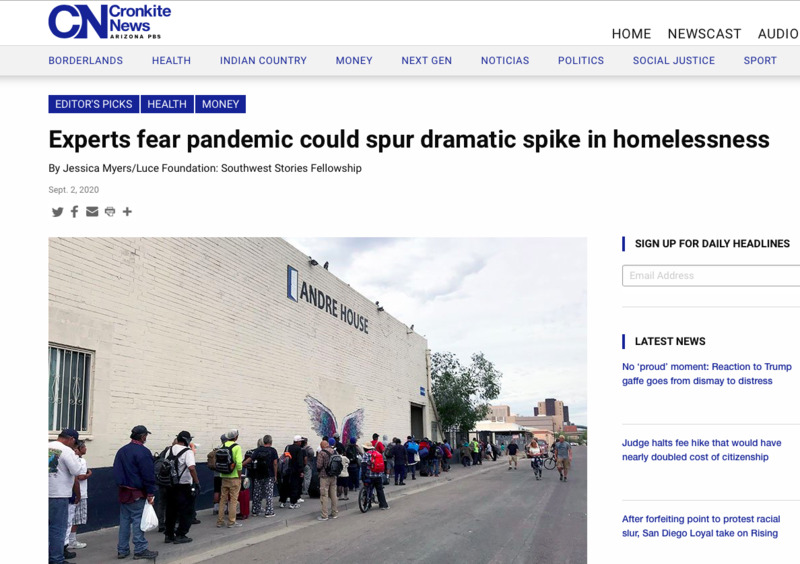Item
Experts fear pandemic could spur dramatic spike in homelessness
Title (Dublin Core)
Experts fear pandemic could spur dramatic spike in homelessness
Description (Dublin Core)
PHOENIX – For more than three decades, André House just west of downtown has provided food, showers, temporary housing and other services to Arizonans experiencing homelessness or poverty.
In the wake of the COVID-19 pandemic, the number of families seeking such services has almost doubled, said Ash Uss, the faith-based nonprofit’s coordinator of advocacy and partnerships.
“We have had families who show up and say, ‘I was just evicted,’ or ‘I’m about to be evicted,’ or ‘We’re living out of our car,’” Uss said. “The need is greater than it ever was.”
On Tuesday, the Centers for Disease Control and Prevention implemented a nationwide temporary eviction moratorium through the end of the year to help stop the spread of COVID-19. Under the order, landlords cannot evict renters who meet certain conditions: “exhausted their best efforts to pay rent, seek Government rental assistance, and are likely to become homeless due to eviction,” according to a statement from the White House.
However, the latest efforts may have little impact for those already struggling to secure housing. A July report from University of Arizona researchers suggests the spike in people seeking homeless services at André House and elsewhere in metro Phoenix may be just the beginning. Researchers found the COVID-19 pandemic and subsequent economic shutdown could increase the state’s homeless population – about 11,000 as of January – by 16% to 42%.
“I think everybody needs to take this very seriously,” said Claudia Powell, associate director of the university’s Southwest Institute for Research on Women and co-author of the report, which put the number of at-risk renters at 365,000.
“It will be a bigger crisis than we can imagine if we don’t act soon.”
In the wake of the COVID-19 pandemic, the number of families seeking such services has almost doubled, said Ash Uss, the faith-based nonprofit’s coordinator of advocacy and partnerships.
“We have had families who show up and say, ‘I was just evicted,’ or ‘I’m about to be evicted,’ or ‘We’re living out of our car,’” Uss said. “The need is greater than it ever was.”
On Tuesday, the Centers for Disease Control and Prevention implemented a nationwide temporary eviction moratorium through the end of the year to help stop the spread of COVID-19. Under the order, landlords cannot evict renters who meet certain conditions: “exhausted their best efforts to pay rent, seek Government rental assistance, and are likely to become homeless due to eviction,” according to a statement from the White House.
However, the latest efforts may have little impact for those already struggling to secure housing. A July report from University of Arizona researchers suggests the spike in people seeking homeless services at André House and elsewhere in metro Phoenix may be just the beginning. Researchers found the COVID-19 pandemic and subsequent economic shutdown could increase the state’s homeless population – about 11,000 as of January – by 16% to 42%.
“I think everybody needs to take this very seriously,” said Claudia Powell, associate director of the university’s Southwest Institute for Research on Women and co-author of the report, which put the number of at-risk renters at 365,000.
“It will be a bigger crisis than we can imagine if we don’t act soon.”
By Jessica Myers/Luce Foundation: Southwest Stories Fellowship
Date (Dublin Core)
Creator (Dublin Core)
Contributor (Dublin Core)
Event Identifier (Dublin Core)
Cronkite-LuceFellowship
Partner (Dublin Core)
Type (Dublin Core)
link
Link (Bibliographic Ontology)
Publisher (Dublin Core)
Cronkite News
Controlled Vocabulary (Dublin Core)
Curator's Tags (Omeka Classic)
Contributor's Tags (a true folksonomy) (Friend of a Friend)
lucegrant
Collection (Dublin Core)
Linked Data (Dublin Core)
Exhibit (Dublin Core)
Southwest Stories>Schools, Services & Small Businesses
Southwest Stories>Jessica Myers
Date Submitted (Dublin Core)
10/01/2020
Date Modified (Dublin Core)
10/01/2020
10/21/2020
07/15/2021
03/23/2022
06/11/2022
11/12/2023


